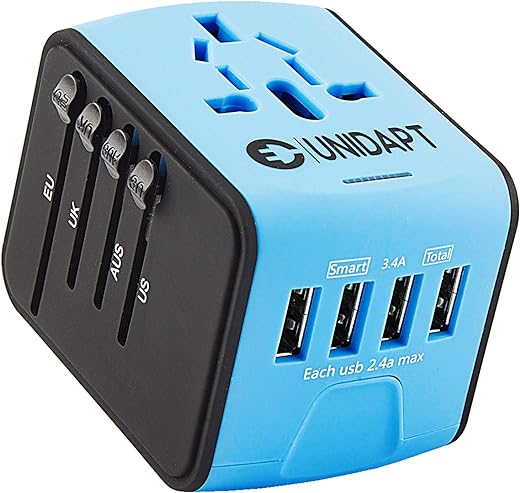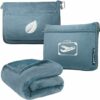
Hey there, fellow globetrotters! If you’re anything like me, you probably can’t resist the call of a new adventure. Just the thought of exploring new places, trying new foods, and immersing yourself in different cultures can make your heart skip a beat. But, there’s one thing that can put a damper on your travel plans – dealing with different types of plugs and sockets around the world.
Don’t you just hate it when you arrive at your dream destination and realize that your trusty charger doesn’t fit into the local outlets? Trust me, I’ve been there, and it’s no fun at all. That’s why I’ve decided to dedicate this blog post to all things travel adapters.
In this post, we’ll take a closer look at the various types of plugs that travel adapters support. Whether you’re planning a weekend getaway or a long-term adventure, understanding which plugs are compatible with your travel adapter can save you from any charging nightmares and keep your devices juiced up and ready to capture those priceless travel moments. So, grab your passport and let’s dive into the world of travel adapters together!
Power up and stay connected with our top-rated travel adapters and chargers!
Types of plugs supported by travel adapters
When it comes to traveling internationally, one common challenge is dealing with different types of electrical plugs used in various regions around the world. However, with the help of travel adapters, you can easily overcome this obstacle and keep your devices powered up wherever you go. In this blog section, we will explore the different types of plugs that travel adapters can support, making your travel experience hassle-free and convenient.
Type A Plug
Type A plugs are mainly used in North and Central America, Japan, and some parts of South America and the Caribbean. These plugs have two flat pins and are compatible with most American devices. So, if you’re traveling to the United States, Canada, or Japan, a travel adapter that supports Type A plugs will be your go-to solution.
Popular Type A-compatible device examples:
- Apple iPhone
- Amazon Kindle
Type C Plug
Type C plugs, also known as Europlugs, are commonly used in Europe, South America, Africa, and Asia. These plugs have two round pins and are the most widely supported plug type across the globe. So, if you’re planning a trip to France, Germany, or any other European country, a travel adapter with Type C support will ensure your devices stay charged.
Popular Type C-compatible device examples:
- Samsung Galaxy smartphones
- Sony PlayStation controllers
Type G Plug
Type G plugs are predominantly used in the United Kingdom, Ireland, and several other countries across the globe. These plugs have three rectangular pins in a triangular pattern and are known for their safety features. If your travel plans include destinations like the UK, a travel adapter that accommodates Type G plugs is a must-have.
Popular Type G-compatible device examples:
- Dyson hairdryers
- Philips electric toothbrushes
Other Plug Types
Apart from the popular plug types mentioned above, there are several other plug types used in specific countries or regions. These include Type B plugs (used in the United States, Canada, and Mexico), Type D plugs (used in India), Type E plugs (used in France, Belgium, and Poland), and many more. If you’re traveling to a specific country, it’s essential to check the plug type used there and ensure your travel adapter supports it.
Benefits of Travel Adapters
Choosing a travel adapter that supports multiple plug types offers several benefits, including:
- Convenience: With a versatile travel adapter, you can charge your devices without worrying about compatibility issues, no matter where you are in the world.
- Cost-effectiveness: Instead of purchasing separate adapters for different plug types, a single travel adapter can cover all your charging needs.
- Compact and portable: Travel adapters are designed to be lightweight and compact, making them easy to carry in your bag or pocket.
To summarize, travel adapters that support various plug types are essential for any international traveler. They provide convenience, cost-effectiveness, and peace of mind, ensuring your devices stay charged wherever you go. So, before embarking on your next adventure, make sure to invest in a reliable travel adapter that meets your plug compatibility requirements.
Remember, it’s always better to be prepared rather than scrambling for a charger that fits your specific destination’s plug type when you’re already on the move!
Compatibility with international outlets
One of the essential aspects to consider when traveling abroad is ensuring that your electronic devices can be used in a different country’s electrical outlets. In this blog section, we will explore how travel adapters are designed to work with various types of international outlets. We’ll cover the differences in voltage and frequency between countries, as well as emphasize the importance of checking the compatibility of your devices before using a travel adapter.
Understanding Voltage and Frequency Differences
Voltage: Different countries have different electrical voltage standards. For instance, the United States and Canada typically operate on a 120-volt system, while many European countries use a 220-240-volt system. These variations can cause damage to your devices if they are not compatible with the voltage of the country you’re visiting. Therefore, it’s crucial to check the voltage ratings of your devices before connecting them to an international outlet.
Frequency: Frequency refers to the number of alternating current cycles per second, measured in hertz (Hz). The most common frequencies around the world are 50 Hz and 60 Hz. While most devices can handle both frequencies, some sensitive electronics, such as certain medical equipment or audiovisual systems, may require specific frequencies to function correctly. Make sure to verify the frequency requirements of your devices to avoid any issues during your travels.
Travel Adapters: Your Gateway to Global Compatibility
Travel adapters are lifesavers when it comes to ensuring your devices can be used safely and efficiently in different countries. These small, portable devices bridge the gap between the plug on your device and the outlet in the foreign country. Here are some essential points to consider when using a travel adapter:
- Plug Types: Different regions around the world have their own plug types, which can vary in shape and size. Travel adapters come with various plug options to accommodate different outlets. For instance, you may encounter Type A, Type C, Type G, or Type I plugs, among others. Ensure that the travel adapter you choose has the appropriate plug types for the countries you plan to visit.
- Voltage Conversion: Some travel adapters also include voltage conversion capabilities, allowing you to use devices that operate on different voltage systems. If you have a device that is not compatible with the voltage of the country you’re visiting, make sure to invest in a travel adapter with a built-in voltage converter. This will protect your devices from potential damage caused by voltage mismatches.
- USB Ports: Many modern travel adapters also come equipped with USB ports, providing additional convenience for charging your smartphones, tablets, or other USB-powered devices. This eliminates the need for separate chargers and saves space in your luggage.
Checking Device Compatibility
While travel adapters are incredibly useful, it’s essential to verify the compatibility of your devices before using them with an adapter. Here are a few steps to follow:
- Read the Device Specifications: Check the user manual or the device’s specifications to determine its voltage and frequency compatibility. This information is usually found on a sticker or label attached to the device or its power adapter.
- Consider Voltage Converters: If your device is not compatible with the voltage of the country you’re visiting, consider investing in a voltage converter. This device will transform the electrical voltage to match the requirements of your device, ensuring safe and optimal operation.
- Research Country-Specific Requirements: If you’re unsure about the voltage and frequency standards of the country you’re visiting, conduct some research online or consult travel guides to gather information. Understanding the requirements will help you make informed decisions regarding your device compatibility and the travel adapter you need.
Remember, taking a few moments to ensure your devices are compatible with international outlets can save you from potential damage and inconveniences during your travels. Travel adapters are readily available from various brands, such as Belkin, TESSAN, and Kensington. Prioritize safety and convenience by choosing a reliable travel adapter that meets your specific needs.
Note: The information provided in this blog section is meant to serve as a general guide. Always refer to the user manual or consult the manufacturer for specific instructions regarding the compatibility and usage of your devices.
Features to consider when choosing a travel adapter
When it comes to international travel, one essential item you should never forget is a travel adapter. It’s the perfect companion to keep your devices charged and connected while you explore new destinations. However, with so many options available, it can be overwhelming to choose the right travel adapter for your needs. That’s why we have compiled a list of key features to consider when selecting a travel adapter. Let’s dive in:
Number of USB Ports
In today’s digital age, it’s not uncommon to travel with multiple devices that rely on USB charging. Whether it’s your smartphone, tablet, smartwatch, or camera, having enough USB ports on your travel adapter is crucial. Look for adapters that offer multiple USB ports, as it allows you to charge multiple devices simultaneously. For example, the Anker PowerPort 4 is a popular choice that provides four USB ports, perfect for charging your devices all at once.
Built-in Surge Protection
Protecting your devices from power surges is vital, especially when you’re in a foreign country with different electrical systems. Look for a travel adapter that includes built-in surge protection to safeguard your devices from voltage spikes. This feature will give you peace of mind and prevent any potential damage to your expensive gadgets. The Belkin BZ103050-TVL is an excellent option with built-in surge protection, ensuring your devices are safe from power fluctuations.
Compactness and Portability
When you’re traveling, you want your luggage to be as light and compact as possible. That’s why choosing a travel adapter that is compact and portable is essential. Look for adapters that are designed to be sleek and lightweight, making them easy to carry and store in your bag. The FosPower FUSE WorldWide is a compact travel adapter that easily fits into your pocket, ensuring you can stay connected wherever you go.
Handling Multiple Plug Types
Different countries use different types of plugs, and it can be a hassle to carry multiple adapters for each destination. Opt for a travel adapter that can handle multiple plug types, allowing you to use it in various countries without any issues. Look for adapters that come with interchangeable plug heads or have a universal input that accepts different types of plugs. The BESTEK Universal Travel Adapter is a versatile choice that supports multiple plug types, making it convenient for your international travels.
Compatibility with Voltage Requirements
Another crucial factor to consider is compatibility with different voltage requirements. Some countries have varying voltage standards, and using the wrong voltage can damage your devices. Look for travel adapters that have a voltage switch or are compatible with a wide range of voltages (100-240V), ensuring you can safely charge your devices anywhere in the world. The LOOP World Travel Adapter is a dependable option that offers compatibility with various voltage requirements.
To summarize, when choosing a travel adapter, consider the number of USB ports, built-in surge protection, compactness, handling multiple plug types, and compatibility with voltage requirements. By carefully evaluating these features, you can select a travel adapter that suits your specific needs and ensures a hassle-free charging experience during your travels.
If you’re still unsure, here’s a quick comparison table to help you make an informed decision:
| Travel Adapter Model | Number of USB Ports | Built-in Surge Protection | Compactness | Handling Multiple Plug Types | Compatibility with Voltage Requirements |
|---|---|---|---|---|---|
| Anker PowerPort 4 | 4 | Yes | No | No | Yes |
| Belkin BZ103050-TVL | 0 | Yes | Yes | No | Yes |
| FosPower FUSE WorldWide | 0 | No | Yes | Yes | Yes |
| BESTEK Universal Adapter | 0 | No | No | Yes | Yes |
| LOOP World Travel Adapter | 0 | No | Yes | Yes | Yes |
We hope this guide helps you find the perfect travel adapter for your upcoming adventures!
Wrap it up: Understanding the compatibility of travel adapters with different plug types
In summary, understanding the types of plugs supported by travel adapters is essential for hassle-free charging during your travels. By knowing which plugs are compatible with international outlets, considering important features, and following the provided tips, you can confidently choose the right travel adapter for your needs. So go ahead and explore the world without worrying about charging your devices!














I recently bought a travel adapter for my trip to Australia and it worked perfectly! I was able to charge my phone, laptop, and camera without any issues. Highly recommend getting a good quality adapter.
This article was really helpful! I recently traveled to Europe and had trouble finding the right travel adapter for my devices. I wish I had read this before my trip!
Thank you for your feedback! I’m glad you found the article helpful. If you have any specific questions, feel free to ask!
Can anyone recommend a specific travel adapter for use in South America? I’ll be traveling to multiple countries in the region and I want to make sure I have the right adapter.
I’ve heard mixed opinions about using travel adapters with grounded plugs. Some people say it’s not safe, while others say it’s fine. What’s your take on this?
That’s an interesting point! While travel adapters with grounded plugs can be used in many cases, it’s important to ensure that the outlet you’re plugging into is also grounded. If there’s any doubt, it’s best to consult with a local electrician or use an ungrounded adapter to avoid any potential safety issues.
Can you provide more information about the compatibility of travel adapters with outlets in Asia? I’m planning a trip to Japan and want to make sure I have the right adapter.
Absolutely! Travel adapters for Japan usually support Type A, Type B, and Type C plugs. These are the most common types in Japan. If you have any further questions, let me know!
I always carry a universal travel adapter with me whenever I travel. It’s so convenient to have one adapter that covers multiple plug types. Plus, it’s compact and easy to pack!
I’ve used travel adapters before and sometimes they don’t fit snugly in the outlet, causing connection issues. Do you have any recommendations for adapters that have a secure fit?
I found this article to be a great resource, but it would be even better if it included information about voltage compatibility. It’s an important aspect to consider when using travel adapters.
Thank you for your feedback! You’re absolutely right, voltage compatibility is an important consideration when using travel adapters. I’ll make sure to include that information in future articles. Thanks for the suggestion!
I’d love to see an article about travel adapters that have built-in USB ports. It would be so convenient to charge my devices without needing an extra charger.
Great suggestion! I’ll definitely consider writing an article about travel adapters with built-in USB ports. They are indeed very convenient for charging devices. Thanks for the suggestion!